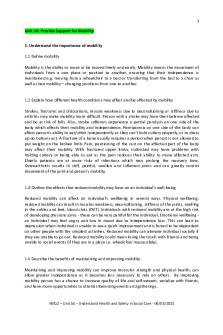Long v. Provide Commerce PDF

| Title | Long v. Provide Commerce |
|---|---|
| Course | Contracts |
| Institution | Boston College |
| Pages | 2 |
| File Size | 85.7 KB |
| File Type | |
| Total Downloads | 39 |
| Total Views | 148 |
Summary
Brief...
Description
Electronic and “Layered” Contracting
Long [plaintiff] v. Provide Commerce, Inc. COURT AND DATE: California Court of Appeal 200 Cal. Rptr. 3d 117 (2016) PROCEDURAL HISTORY: Trial Court: Plaintiff sued asserting claims for violations of the Consumers Legal Remedies Act and unfair competition law on behalf of himself and a class of others. Court agrees that the hyperlinks were too inconspicuous to put a reasonably prudent Internet consumer on inquiry notice. Plaintiff wins. Provide appeals. Appellate Court:
ISSUE: Absent actual notice, is a browsewrap agreement valid if the website does not put a reasonably prudent user on inquiry notice of the terms of the agreement?
TRIGGER FACTS: Each page of Provide Commerce Inc.’s (defendant) website, ProFlowers.com, included on the bottom a hyperlink to Provide’s terms of use. The terms of use included a compelled-arbitration clause. Website users were not required to click on the hyperlink or otherwise read or assent to the terms of use to complete a transaction. To complete an order on the website, the user was required to fill out certain fields contained in a big white box in the middle of the page and to click “Submit” within the same box. The background of the webpage was lime green. The terms of use hyperlink appeared in light green font in the lime green background, below the white box. The hyperlink was among other items in the lime green area, such as a VeriSign Secured logo and a hyperlink to the website’s privacy policy.
PLAINTIFF’S MAIN ARGUMENTS: He was not bound by the foregoing arbitration provision because he neither had notice of no assented to the Terms of Use.
DEFENDANT’S MAIN ARGUMENTS: Plaintiff was bound by the Terms of Use including the dispute resolution provision contained therein. The placement of the ToU hyperlinks couples with the hyperlink to terms in the subsequent order confirmation email was obvious enough to put the plaintiff on inquiry notice as to the contents of agreement.
RULE (the law): Absent actual notice, a browsewrap agreement is valid if the website puts a reasonably prudent user on inquiry notice of the terms of the agreement.
HOLDING + REASONING: No. Absent actual notice, a browsewrap agreement is valid if the website puts a reasonably prudent user on inquiry notice of the terms of the agreement. A key
Electronic and “Layered” Contracting factor in analyzing this question is the reasonable conspicuousness of the existence of the terms. In most cases, websites should include a notice clearly stating that a user’s continued use of the site amounts to the user’s agreement to the company’s terms of use. Of course, a browsewrap agreement will also be valid if the user has actual knowledge of the terms. More generally, courts determine the validity of a browsewrap agreement under the same objective standard of any other contract, namely outward manifestations of mutual assent. In this case, the trial court correctly denied Provide’s petition to compel arbitration. First, there is no dispute that Long did not have actual knowledge of Provide’s terms of use. The question then turns to whether Provide’s website puts a reasonably prudent user on inquiry notice of the terms of use. The court holds that it does not. The terms of use, although located on the same page as the user’s checkout page, appears with a few other hyperlinks below the field the user has to fill out to complete a transaction. There is no warning or direction from the webpage that a user should click on the hyperlink, and there is no indication that a user is agreeing to the terms of use by continuing to use the website. A reasonably prudent user would have no reason to look below the submit button in the white box. In sum, Provide’s terms of use are not reasonably conspicuous to a reasonably prudent user of Provide’s website. Accordingly, Provide’s browsewrap agreement including the terms of use is invalid. The judgment denying Provide’s motion to compel arbitration based on the terms of use is affirmed....
Similar Free PDFs

Long v. Provide Commerce
- 2 Pages

Palsgraf v Long Island R
- 3 Pages

Long term care - Long
- 4 Pages

Brittany Long v SIM Care Plan
- 10 Pages

Content provide overview
- 7 Pages

provide room service
- 66 Pages

M-commerce
- 20 Pages

Pao On v Lau Yiu Long case brief
- 2 Pages

Commerce international
- 21 Pages
Popular Institutions
- Tinajero National High School - Annex
- Politeknik Caltex Riau
- Yokohama City University
- SGT University
- University of Al-Qadisiyah
- Divine Word College of Vigan
- Techniek College Rotterdam
- Universidade de Santiago
- Universiti Teknologi MARA Cawangan Johor Kampus Pasir Gudang
- Poltekkes Kemenkes Yogyakarta
- Baguio City National High School
- Colegio san marcos
- preparatoria uno
- Centro de Bachillerato Tecnológico Industrial y de Servicios No. 107
- Dalian Maritime University
- Quang Trung Secondary School
- Colegio Tecnológico en Informática
- Corporación Regional de Educación Superior
- Grupo CEDVA
- Dar Al Uloom University
- Centro de Estudios Preuniversitarios de la Universidad Nacional de Ingeniería
- 上智大学
- Aakash International School, Nuna Majara
- San Felipe Neri Catholic School
- Kang Chiao International School - New Taipei City
- Misamis Occidental National High School
- Institución Educativa Escuela Normal Juan Ladrilleros
- Kolehiyo ng Pantukan
- Batanes State College
- Instituto Continental
- Sekolah Menengah Kejuruan Kesehatan Kaltara (Tarakan)
- Colegio de La Inmaculada Concepcion - Cebu






